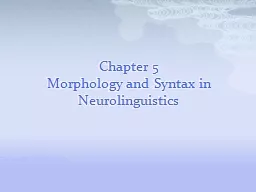PPT-MORPHOLOGY (Study of words)
Author : yvonne | Published Date : 2023-10-29
In linguistics morphology is the study of words how they are formed and their relationship to other words in the same language 2 It analyzes the structure of words
Presentation Embed Code
Download Presentation
Download Presentation The PPT/PDF document "MORPHOLOGY (Study of words)" is the property of its rightful owner. Permission is granted to download and print the materials on this website for personal, non-commercial use only, and to display it on your personal computer provided you do not modify the materials and that you retain all copyright notices contained in the materials. By downloading content from our website, you accept the terms of this agreement.
MORPHOLOGY (Study of words): Transcript
Download Rules Of Document
"MORPHOLOGY (Study of words)"The content belongs to its owner. You may download and print it for personal use, without modification, and keep all copyright notices. By downloading, you agree to these terms.
Related Documents














